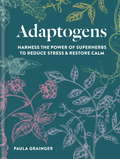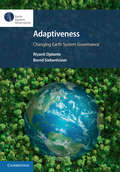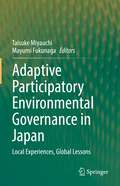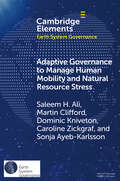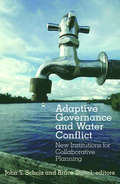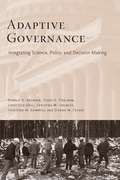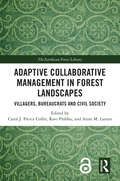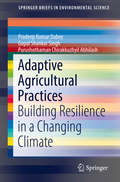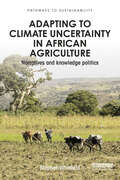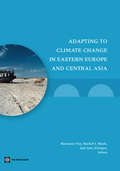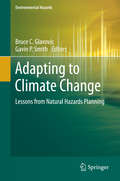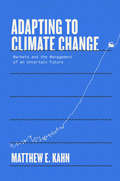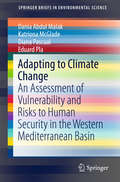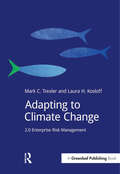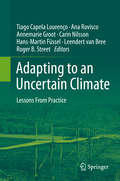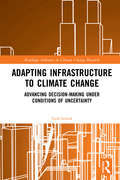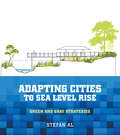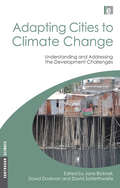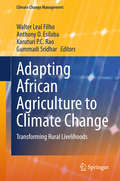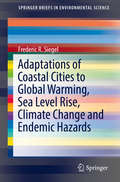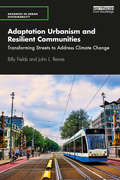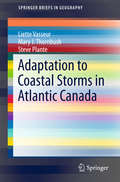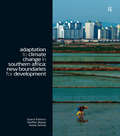- Table View
- List View
Adaptogens: Harness the power of superherbs to reduce stress & restore calm
by Paula GraingerIncreasing numbers of people are suffering from stress, anxiety and fatigue caused by lack of sleep, digital overload and our 24/7 lifestyle. In Adaptogens, Medical Herbalist Paula Grainger provides an answer to this modern-day affliction by introducing us to the group of powerful herbal ingredients known as adaptogens..Adaptogens, such as Ashwagandha, Maca, Korean ginseng, Turmeric, Reishi mushrooms, Liquorice, Rosemary and Rhodiola, have been scientifically proven to lower levels of the stress hormone cortisol and prevent adrenal imbalances that can lead to adrenal fatigue and 'burn-out'. Delve into the history and science of these miraculous plants and learn how to maximize wellness using the most easy-to-source adaptogens, incorporating them into your life via delicious smoothies, energy bites and desserts, invigorating teas, tonics and lattes, and wonderful beauty elixirs.
Adaptogens: Harness the power of superherbs to reduce stress & restore calm
by Paula GraingerIncreasing numbers of people are suffering from stress, anxiety and fatigue caused by lack of sleep, digital overload and our 24/7 lifestyle. In Adaptogens, Medical Herbalist Paula Grainger provides an answer to this modern-day affliction by introducing us to the group of powerful herbal ingredients known as adaptogens..Adaptogens, such as Ashwagandha, Maca, Korean ginseng, Turmeric, Reishi mushrooms, Liquorice, Rosemary and Rhodiola, have been scientifically proven to lower levels of the stress hormone cortisol and prevent adrenal imbalances that can lead to adrenal fatigue and 'burn-out'. Delve into the history and science of these miraculous plants and learn how to maximize wellness using the most easy-to-source adaptogens, incorporating them into your life via delicious smoothies, energy bites and desserts, invigorating teas, tonics and lattes, and wonderful beauty elixirs.
Adaptiveness: Changing Earth System Governance
by Bernd Siebenhüner Riyanti DjalanteRapid and transformational actions are ever more urgently needed to achieve a just, resilient, and ecologically sustainable global society, as envisioned and supported by the Sustainable Development Goals. Moreover, dynamic governance approaches are vital for addressing changing and uncertain conditions. At many levels, governance needs to be responsive and flexible - in one word - adaptive. This book provides a state-of-the-art review of the conceptual development of adaptiveness as a key concept in the environmental governance literature, complemented by applications from global, regional, and national levels. It reviews the politics of adaptiveness, investigates which governance processes foster adaptiveness, and discusses how, when and why adaptiveness influences earth system governance. It is a timely synthesis for students, researchers and practitioners interested in environmental governance, sustainability and social change processes. This is one of a series of publications associated with the Earth System Governance Project. For more publications, see www.cambridge.org/earth-system-governance.
Adaptive Participatory Environmental Governance in Japan: Local Experiences, Global Lessons
by Taisuke Miyauchi Mayumi FukunagaThis book contributes to the theoretical and practitioner literature in environmental governance and sustainability of natural resources by linking case studies of the roles of narratives to the three key practices in local environmental governance: socio-political legitimacy in participation; collaboratively creating stakeholder-ness, and cultivating social and ecological capabilities. It provides numerous theoretical insights on legitimacy, adaptability, narratives, process-oriented collaborative planning, and among others, using in-depth case studies from historical and contemporary environmental issues including conservation, wildlife management, nuclear and tsunami disasters, and thus community risk, recovery, and resiliency. The authors are all practitioner-oriented scientists and scholars who are involved as local stakeholders in these practices. The chapters highlight their action and participatory-action research that adds deeper insights and analyses to successes, failures, and struggles in how narratives contribute to these three dimensions of effective environmental governance. It also shows how stakeholders’ kinds of expertise, in a historical context, help to bridge expert and citizen legitimacy, as well as spatial and jurisdictional governance structures across scales of socio-political governanceOf particular interest, both within Japan and beyond, the book shares with readers how to design and manage practical governance methods with narratives. The detailed design methods include co-imagination of historical and current SESs, designing processes for collaborative productions of knowledge and perceptions, legitimacy and stakeholder-ness, contextualization of contested experiences among actors, and the creation of evaluation standards of what is effective and effective local environmental governance.The case studies and their findings reflect particular local contexts in Japan, but our experiences of multiple natural disasters, high economic growth and development, pollutions, the nuclear power plant accident, and rapidly aging society provide shared contexts of realities and provisional insights to other societies, especially to Asian societies.
Adaptive Governance to Manage Human Mobility and Natural Resource Stress (Elements in Earth System Governance)
by Saleem H. Ali Martin Clifford Dominic Kniveton Caroline Zickgraf Sonja Ayeb-KarlssonConnections between resources and migration operate as a complex adaptive system rather than being premised in linear, causal mechanisms. The systems thinking advocated within this Element increases the inclusion of socio-psychological, financial, demographic, environmental and political dimensions that mediate resource-(im)mobility pathways. The Earth Systems Governance paradigm provides a way to manage global migration flows more effectively, allowing for consideration of networks and interdependencies in addition to its inherent adaptiveness. Resource rushes, hydropower displacement, and climate-induced retreat from coastal areas are all examples of circumstances linking resources and human mobility. Movement can also ameliorate environmental conditions and hence close monitoring of impacts and policies which harness benefits of migration is advocated. Green remittance bonds, and land tenure policies favoring better arable resource usage are key ingredients of a more systems-oriented approach to managing mobility. The Global Compact on Migration offers an opportunity to operationalize such adaptive governance approaches in the Anthropocene.
Adaptive Governance and Water Conflict: New Institutions for Collaborative Planning
by John T. Scholz Bruce StiftelWater policy seems in perpetual crisis. Increasingly, conflicts extend beyond the statutory authority, competence, geographical jurisdictions, and political constituencies of highly specialized governing authorities. While other books address specific policy approaches or the application of adaptive management strategies to specific problems, this is the first book to focus more broadly on adaptive governance, or the evolution of new institutions that attempt to resolve conflicts among competing authorities. Adaptive Governance and Water Conflict investigates new types of water conflicts among users in the seemingly water-rich Eastern United States. Eight case studies of water quality, water quantity, and habitat preservation or restoration in Florida were chosen to span the range of conflicts crossing fragmented regulatory boundaries. Each begins with a history of the conflict and then focuses on the innovative institutional arrangements - some successful, some not - that evolved to grapple with the resulting challenges. In the chapters that follow, scholars and practitioners in urban planning, political science, engineering, law, policy, administration, and geology offer different theoretical and experience-based perspectives on the cases. Together, they discuss five challenges that new institutions must overcome to develop sustainable solutions for water users: Who is to be involved in the policy process? How are they to interact? How is science to be used? How are users and the public to be made aware? How can solutions be made efficient and equitable? In its diverse perspectives and unique combination of theory, application, and analysis, Adaptive Governance and Water Conflict will be a valuable book for water professionals, policy scientists, students, and scholars in natural resource planning and management.
Adaptive Governance: Integrating Science, Policy, and Decision Making
by Ronald Brunner Toddi Steelman Lindy Coe-Juell Christina Cromley Christine Edwards Donna TuckerDrawing on five detailed case studies from the American West, the authors explore and clarify how to expedite a transition toward adaptive governance and break the gridlock in natural resource policymaking. Unlike scientific management, which relies on science as the foundation for policies made through a central bureaucratic authority, adaptive governance integrates various types of knowledge and organizations. Adaptive governance relies on open decision-making processes recognizing multiple interests, community-based initiatives, and an integrative science in addition to traditional science. Case studies discussed include a program to protect endangered fish in the Colorado River with the active participation of water developers and environmentalists; a district ranger's innovative plan to manage national forestland in northern New Mexico; and how community-based forestry groups are affecting legislative change in Washington, D.C.
Adaptive Collaborative Management in Forest Landscapes: Villagers, Bureaucrats and Civil Society (The Earthscan Forest Library)
by Carol J. Pierce Colfer, Ravi Prabhu, and Anne M. LarsonThis book examines the value of Adaptive Collaborative Management for facilitating learning and collaboration with local communities and beyond, utilising detailed studies of forest landscapes and communities. Many forest management proposals are based on top-down strategies, such as the Million Tree Initiatives, Forest Landscape Restoration (FLR) and REDD+, often neglecting local communities. In the context of the climate crisis, it is imperative that local peoples and communities are an integral part of all decisions relating to resource management. Rather than being seen as beneficiaries or people to be safeguarded, they should be seen as full partners, and Adaptive Collaborative Management is an approach which priorities the rights and roles of communities alongside the need to address the environmental crisis. The volume presents detailed case studies and real life examples from across the globe, promoting and prioritizing the voices of women and scholars and practitioners from the Global South who are often under-represented. Providing concrete examples of ways that a bottom-up approach can function to enhance development sustainably, via its practitioners and far beyond the locale in which they initially worked, this volume demonstrates the lasting utility of approaches like Adaptive Collaborative Management that emphasize local control, inclusiveness and local creativity in management. This book will be of great interest to students, scholars and practitioners working in the fields of conservation, forest management, community development and natural resource management and development studies more broadly.
The Adaptive Challenge of Climate Change
by O'Brien, Karen and Selboe, Elin Karen O'Brien Elin SelboeThis book presents a new perspective on adaptation to climate change. It considers climate change as more than a problem that can be addressed solely through technical expertise. Instead, it approaches climate change as an adaptive challenge that is fundamentally linked to beliefs, values and worldviews, as well as to power, politics, identities and interests. Drawing on case studies from high-income countries, the book argues that it is time to consider adaptation to climate change as a challenge of social, personal and political transformations. The authors represent a variety of fields and perspectives, illustrating the importance of interdisciplinary approaches to the problem. The book will be of interest to researchers, policy makers and advanced students in the environmental sciences, social sciences and humanities, as well as to decision makers and practitioners interested in new ideas about adapting to climate change.
Adaptive Agricultural Practices: Building Resilience in a Changing Climate (SpringerBriefs in Environmental Science)
by Pradeep Kumar Dubey Gopal Shankar Singh Purushothaman Chirakkuzhyil AbhilashThis brief explores several adaptive agricultural practices from around the world to fulfill current and future agricultural demands for food security due to the challenges posed by climate change and growing global population. Readers will discover how farmers adapt to environmental changes by adopting various agronomic practices at crop, farm and landscape levels. Particular attention is given to systemic and transformational adaptation strategies employed by farmers such as mulching, organic farming and crop diversification. This is a highly informative and carefully presented book that provides insights on how crops can build up resilience against periods of drought, high salinity, disasters such as floods, and diseases. The policy implications and future prospects of these adaptation strategies are also addressed. Environmental and plant scientists, agronomists and researchers in climate sciences will find this book interesting.
Adapting to Climate Uncertainty in African Agriculture: Narratives and knowledge politics (Pathways to Sustainability)
by Stephen WhitfieldFuture climatic and agro-ecological changes in Africa are uncertain and associated with high degrees of spatial and temporal variability and this change is differently simulated within divergent climate-crop models and in controlled crop breeding stations. Furthermore, uncertainty emerges in local contexts, not just in response to climatic systems, but to social, economic, and political systems, and often with implications for the appropriateness and adoption of technologies or the success of alternative cropping systems. This book examines the challenges of adaptation in smallholder farming in Africa, analysing the social, economic, political and climatic uncertainties that impact on agriculture in the region and the range of solutions proposed. Drawing on case studies of genetically modified crops, conservation agriculture, and other 'climate smart' solutions in eastern and southern Africa, the book identifies how uncertainties are framed 'from above' as well experienced 'from below', by farmers themselves. It provides a compelling insight into why ideas about adaptation emerge, from whom, and with what implications. This book offers a unique perspective and will be highly relevant to students of climate change adaptation, food security and poverty alleviation, as well as policy-makers and field practitioners in international development and agronomy.
Adapting to Climate Change in Eastern Europe and Central Asia
by Marianne Fay Jane Ebinger Rachel BlockThe region of Eastern Europe and Central Asia (ECA) is already experiencing the consequences of climate change: increasing variability, warmer temperatures, altered hydrology. Events such as droughts, floods, heat waves, windstorms, and forest fires are increasing in number and severity. The concentration of greenhouse gases already in the atmosphere guarantees that similar or greater changes are yet to come-even if the world were to completely stop emitting CO2 today. This region is particularly vulnerable because of its legacy of socioeconomic issues, environmental mismanagement, aging infrastructure and housing, and under-investment in hydrometeorological, rural, and health institutions. The resulting adaptation deficit will exacerbate climate risks and hamper the ability of sectors that could gain from climate change, such as agriculture, to reap the full benefits. 'Adapting to Climate Change in Eastern Europe and Central Asia' presents an overview of what adaptation to climate change might mean for the countries of ECA. It starts with a discussion of emerging best-practice adaptation planning around the world and a review of the latest climate projections. It then discusses possible actions to improve resilience organized around impacts on natural resources, health, the unbuilt environment of agriculture and forestry, and the built environment of infrastructure and housing. The book concludes with a discussion of two areas in great need of strengthening: disaster preparedness and hydrometeorological services. The next decade offers a window of opportunity for ECA countries to make their development more resilient to climate change. While some impacts of climate change are already being felt, they are likely to remain manageable over the next decade, offering the ECA region a short period of time to focus on actions that have numerous benefits both today and in the future.
Adapting to Climate Change: Lessons from Natural Hazards Planning (Environmental Hazards)
by Bruce C. Glavovic Gavin P. SmithThis book identifies lessons learned from natural hazard experiences to help communities plan for and adapt to climate change. Written by leading experts, the case studies examine diverse experiences, from severe storms to sea-level related hazards, droughts, heat waves, wildfires, floods, earthquakes and tsunami, in North America, Europe, Australasia, Asia, Africa and Small Island Developing States. The lessons are grouped according to four imperatives: (i) Develop collaborative governance networks; (ii) build adaptive capabilities; (iii) invest in pre-event planning; and (iv) the moral imperative to undertake adaptive actions that advance resilience and sustainability. "A theoretically rich and empirically grounded analysis of the interface between disaster risk management and climate change adaptation, comprehensive yet accessible, and very timely. " Mark Pelling, Department of Geography, King's College London, UK. "This book represents a major contribution to the understanding of natural hazards planning as an urgent first step for reducing disaster risk and adapting to climate change to ensure sustainable and equitable development. " Sálvano Briceño, Vice-Chair, Science Committee, Integrated Research on Disaster Risk IRDR, an ICSU/ISSC/ISDR programme. Former Director International Strategy for Disaster Reduction, UNISDR. "What a welcome addition to the young literature on climate adaptation and hazard mitigation! Bruc e Glavovic and Gavin Smith each bring to the editing task a rare blend of solid scholarly attainment and on-the-ground experience that shines through in this extensively-documented synthesis of theoretical ideas from the realms of climate and hazards and their validation in a rich set of diverse case studies pulled in from around the world. This book should remain a classic for many years. " William H. Hooke, American Meteorological Society.
Adapting to Climate Change: Markets and the Management of an Uncertain Future
by Matthew E. KahnA revelatory study of how climate change will affect individual economic decisions, and the broad impact of those choicesSelected by Publishers Weekly as one of its Top Ten books in Business and Economics for Spring 2021 It is all but certain that the next century will be hotter than any we&’ve experienced before. Even if we get serious about fighting climate change, it&’s clear that we will need to adapt to the changes already underway in our environment. This book considers how individual economic choices in response to climate change will transform the larger economy. Using the tools of microeconomics, Matthew E. Kahn explores how decisions about where we live, how our food is grown, and where new business ventures choose to locate are impacted by climate change. Kahn suggests new ways that big data can be deployed to ease energy or water shortages to aid agricultural operations and proposes informed policy changes related to public infrastructure, disaster relief, and real estate to nudge land use, transportation options, and business development in the right direction.
Adapting to Climate Change: An Assessment of Vulnerability and Risks to Human Security in the Western Mediterranean Basin (SpringerBriefs in Environmental Science)
by Katriona Mcglade Dania Abdul Malak Diana Pascual Eduard PlaThis book examines the water-related impacts of climate change in the UNESCO Intercontinental Biosphere Reserve of the Mediterranean (IBRM) straddling Spain and Morocco. This is the first in-depth publication on a fascinating transboundary case study; while climate change effects are rather homogenous across the IBRM, differing socio-economic contexts, land-use patterns and policy frameworks in Spain and Morocco mean considerable variations in vulnerability and consequences for human security. The authors have produced a novel and integrated vulnerability assessment that combines hydro-ecological, socio-economic and policy analyses. The interdisciplinary approach and insights contained in this volume will appeal both to those interested in the integration of natural and social sciences as well as those working on water and climate change from academic, practical or policy-oriented perspectives.
Adapting to Climate Change: 2.0 Enterprise Risk Management (Doshorts Ser.)
by Mark Trexler Laura KosloffMost companies do not yet recognize what it means to adapt to future climate change, and do not yet see it as a business priority. Adapting to Climate Change tackles two key questions facing decision makers: 1) Is adaptation worth it to me? and 2) If it is worth it, can I really tackle it? If a company has reason to worry about the potential impacts of weather on its operations and supply chains, it probably has cause to worry about climate change. However, "adapting to the weather" is not the same as incorporating climate change adaptation into corporate planning. In the former a company is managing conditions they are already experiencing. The latter involves preparing for forecasted impacts of climate change. Focusing on today’s weather and not tomorrow’s climate leaves a lot of risk on the table, especially if the climate continues to change faster than many climate models have projected. The uncertainties associated with forecasting climate change on a timeframe and at a scale that is relevant to corporate decision making can appear daunting. It is not necessary, however, to have perfect information to advance corporate preparedness for and resilience to climate change. Companies can improve their ability to make robust decisions under conditions of uncertainty without perfect information. A Bayesian approach to reducing uncertainty over time can cost-effectively support companies in understanding and managing many potential climate risks and can avoid the need to depend on future predictions. Instead, initial effort can focus on where a company will have confidence in its analysis and the ability to influence its level of risk, namely in assessing its exposure and vulnerability to climate hazards. As the hazards themselves become more clear, risk management strategies can be quickly adapted.
Adapting to an Uncertain Climate: Lessons From Practice
by Tiago Capela Lourenço Ana Rovisco Annemarie Groot Carin Nilsson Hans-Martin Füssel Leendert Bree Roger B. StreetClimate change highlights the challenges for long-term policy making in the face of persistent and irreducible levels of uncertainties. It calls for the development of flexible approaches, innovative governance and other elements that contribute to effective and adaptive decision-making. Exploring these new approaches is also a challenge for those involved in climate research and development of adaptation policy. The book provides a dozen real-life examples of adaptation decision making in the form of case studies: · Water supply management in Portugal, England and Wales and Hungary · Flooding, including flood risk in Ireland, coastal flooding and erosion in Southwest France, and flood management in Australia's Hutt River region · Transport and utilities, including the Austrian Federal railway system, public transit in Dresden, and Québec hydro-electric power · Report examining communication of large numbers of climate scenarios in Dutch climate adaptation workshops.
Adapting Infrastructure to Climate Change: Advancing Decision-Making Under Conditions of Uncertainty (Routledge Advances in Climate Change Research)
by Todd SchenkMany of the challenges that decision-makers grapple with in relation to climate change are governance related. Planning and decision-making is evolving in ambiguous institutional environments, in which many key issues remain unresolved, including relationships between different actors; funding arrangements; and the sources and procedures for vetting data. These issues are particularly acute at this juncture, as climate adaptation moves from broad planning processes to the management of infrastructure systems. Concrete decisions must be made. Adapting Infrastructure to Climate Change draws on case studies of three coastal cities situated within very different governance regimes: neo-corporatist Rotterdam, neo-pluralist Boston and semi-authoritarian Singapore. The book examines how infrastructure managers and other stakeholders grappling with complex and uncertain climate risks are likely to make project-level decisions in practice, and how more effective decision-making can be supported. The differences across governance regimes are currently unaccounted for in adaptation planning, but are crucial as best practices are devised. These lessons are also applicable to infrastructure planning and decision-making in other contexts. This book will be of great interest to scholars of climate change and environmental policy and governance, particularly in the context of infrastructure management.
Adapting Cities to Sea Level Rise: Green and Gray Strategies
by Stefan Al Edgar WesterhofAs cities build more flood-management infrastructure to adapt to the effects of a changing climate, they must go beyond short-term flood protection and consider the long-term effects on the community, its environment, economy, and relationship with the water.Adapting Cities to Sea Level Rise, by infrastructure expert Stefan Al, introduces design responses to sea-level rise, drawing from examples around the globe. Going against standard engineering solutions, Al argues for approaches that are integrated with the public realm, nature-based, and sensitive to local conditions and the community. He features design responses to building resilience that creates new civic assets for cities.With the right solution, Al shows, sea-level rise can become an opportunity to improve our urban areas and landscapes, rather than a threat to our communities.
Adapting Cities to Climate Change: Understanding and Addressing the Development Challenges (Earthscan Climate Ser.)
by Jane Bicknell David Dodman David SatterthwaiteThis volume brings together, for the first time, a wide-ranging and detailed body of information identifying and assessing risk, vulnerability and adaptation to climate change in urban centres in low- and middle-income countries. Framed by an overview of the main possibilities and constraints for adaptation, the contributors examine the implications of climate change for cities in Africa, Asia and Latin America, and propose innovative agendas for adaptation. The book should be of interest to policy makers, practitioners and academics who face the challenge of addressing climate change vulnerability and adaptation in urban centres throughout the global South. Published with E&U and International Institute for Environment and Development
Adapting African Agriculture to Climate Change: Transforming Rural Livelihoods (Climate Change Management)
by Walter Leal Filho Anthony O. Esilaba Karuturi P. C. Rao Gummadi SridharThis book summarizes the evidence from different African countries about the local impacts of climate change, and how farmers are coping with current climate risks. The different contributors show how agricultural systems in developing countries are affected by climate changes and how communities prepare and adapt to these changes.
Adaptations of Coastal Cities to Global Warming, Sea Level Rise, Climate Change and Endemic Hazards (SpringerBriefs in Environmental Science)
by Frederic R. SiegelThis book discusses the identification of, solutions to, and management of threats to high population coastal cities and their seaports from global warming, climate change and endemic hazards. These include prevention of sea water intrusion of freshwater coastal aquifers, emplacement of barriers that mitigate the threats from sea level rise, and inundation of urban centers plus those from storm surges that cause flooding and salination of inshore terrain. The book assesses mitigation of the effects of extreme weather events such as drought, and major flooding from heavy rainfall on coastal urban centers, or on associated drainage basins. It also considers how coastal cities can counter vulnerabilities from other physical hazards (e.g., earthquakes - building codes) and health hazards (e.g., pollution, public health response - preparedness) that may be related to a city’s geological/geographical location and service as a port of entry for goods and travelers (regional and international). The book also cites the high costs of safeguarding citizen and municipal assets, but notes possible sources of potential funding especially from less developed and developing nations. The book is written to give strong background information to students majoring in environmental sciences or those in other majors with interests in the effects of global warming/climate change, and will be of interest to social scientists, think tank personnel, government planners, and lay persons in environmentally oriented organizations.
Adaptation Urbanism and Resilient Communities: Transforming Streets to Address Climate Change (Advances in Urban Sustainability)
by Billy Fields John L. RenneAdaptation Urbanism and Resilient Communities outlines and explains adaptation urbanism as a theoretical framework for understanding and evaluating resilience projects in cities and relates it to pressing contemporary policy issues related to urban climate change mitigation and adaptation. Through a series of detailed case studies, this book uncovers the promise and tensions of a new wave of resilient communities in Europe (Copenhagen, Rotterdam, and London), and the United States (New Orleans and South Florida). In addition, best practice projects in Amsterdam, Barcelona, Delft, Utrecht, and Vancouver are examined. The authors highlight how these communities are reinventing the role of streets and connecting public spaces in adapting to and mitigating climate change through green/blue infrastructure planning, maintaining and enhancing sustainable transportation options, and struggling to ensure equitable development for all residents. The case studies demonstrate that while there are some more universal aspects to encouraging adaptation urbanism, there are also important local characteristics that need to be both acknowledged and celebrated to help local communities thrive in the era of climate change. The book also provides key policy lessons and a roadmap for future research in adaptation urbanism. Advancing resilience policy discourse through multidisciplinary framework this work will be of great interest to students of urban planning, geography, transportation, landscape architecture, and environmental studies, as well as resilience practitioners around the world.
Adaptation to Coastal Storms in Atlantic Canada (SpringerBriefs in Geography)
by Mary J. Thornbush Liette Vasseur Steve PlanteThis Briefs is based on an analysis that was performed on the 2010 winter storms that caused considerable damage to coastal communities in Atlantic Canada. The hazards that occurred were associated with storm surge, coastal erosion, and flooding. The analysis covered a large multi-site longitudinal project, where a participatory action research (PAR) approach was used to understand how people in nine coastal communities perceive and experience extreme weather events and to enhance their capacity to adapt and improve their resilience. This Briefs exposes the outcome of two series of interviews and activities that were conducted during the project, as well as the lessons learned, and general elements that should be considered when researchers collaborate with communities to define adaptation and resilience strategies. It makes an important contribution to the application of PAR as an integrated (social-ecological) approach to resilience and how such an approach [. . . ] can be adapted also to other communities.
Adaptation to Climate Change in Southern Africa: New Boundaries for Development (Climate and Development Series)
by Steffen Bauer Imme ScholzAdverse climate impacts are already evident across Southern Africa and pose a serious threat to the development prospects of the region's societies. Sustainable development in this region will depend on the rapid development and implementation of effective adaptation measures. This volume identifies the new socioeconomic and political boundaries to development that result from ongoing climate change in Southern Africa. The collected papers explore the region's potential for a transition to development strategies that combine meaningful socioeconomic investment and adaptation measures while also improving livelihoods in the region. The chapters are backed up by detailed case studies which underscore the urgent need for national governments and multilateral agencies to develop strategies to support Southern Africa's societies in adapting to climate change.
